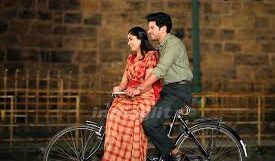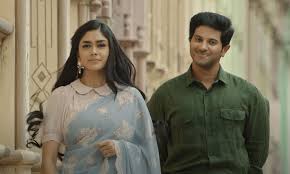Sita Ramam Pan India Tamil Movie Review
Cast-;
Dulquer Salmaan , Mrunal Thakur , Rashmika Mandanna , Sumanth , Tharun Bhascker , Gautham Vasudev Me non ,Bhumika Chawla , Vennela Kishore , Murali Sharma , Prakash Raj , Tinnu Anand , Shatru , Sachin Khedekar , Rohini ,Sunil , Jishhu Sengupta , Priyadarshi Pulikonda , Rahul Ravindran and others .
Crew-;
Directer – Hanu Raghavapudi , Produce – Swapna Cinemas , Banner – Vyjayanthi Movies , Swapna Cinema , Ass ociated with Lyca Productions , Music – Vishal Chandrasekhar , Editor – Kotagiri Venkateswara Rao , DOP – PS Vinod, Shreyaas Krishna , Production Designer – Sunil Babu , Dialogues – Madan Karkey , Costume Designer – Sh eetal Sharma , Additional Screenplay – Rutham Samar, Raj Kumar Kandamudi , Art Director – Vaishnavi Reddy, Faisal Ali Khan , Sound Designer – K.Jai Ganesh (The Sound Smith) ,Sound Mix – A.M.Rahmathulla , DI – Annapur na Studios , Colorist – Vishnu Vardhan , PRO – Yuvaraaj , Digital Media PR & Marketing- Prasad Bhimanadham , Digital Partner – Silly Monks , Audio On Sony Music Entertainment Pvt Ltd , Distibutor – Lyca Productions amd Others .
Story-;
In 1964, Mujahideen, a Pakistani extremist, does not approve of the brotherly relationship of Kasmiri Muslims a nd Hindus. He plans on severing the bond and separating them. He strongly believes that the Indian Army is the reason for the unity. He resorts to brainwashing teenagers in Pakistan and sends them to Kashmir. He advices them to live in disguise to make his plans work. In 1985, Afreen is a fierce Pakistani-based rabble-rouser in Lon don, who dislikes anything about India. She sets fire to the car of an Indian philanthropist, in retaliation, for bu rning Pakistan’s flag. The management board of her university asks her to apologize to him. As Afreen does not like to say sorry to Indians, the philanthropist gives her two choices: either to give him 1 Million (10 Lakhs INR) as compensation or go to prison. Being a stubborn and unapologetic patriot, she decides to compensate him and goes back to Pakistan to meet her grandfather, Pakistan Army Brigadier Tariq, for giving her the money to compe nsate him. However, upon her arrival in Pakistan, she finds out that her grandfather passed away.
He wrote a letter to Afreen in which he asks her to deliver a letter, which he could not, written in 1965, by Indian Army Lieutenant Ram to his lover, Sita Mahalakshmi of India. Though relucant at first, Afreen agrees to deliver the letter to her, so that she can inherit Tariq’s wealth.She goes to Hyderabad in search of Sita. She is acc ompa nied by Balaji, her senior at the university in London. She reaches the address, only to find that to be a ladies hos tel. She asks Subramaniyam, who has been working there for more than twenty years, about Sita. He tells Afreen that the hostel was the royal palace of the Nawab of Hyderabad once. He also adds that nobody with the name o f Sita was there, twenty years ago. Clueless, Afreen does not know how to find Sita without any details. Upon get ting an idea, she goes in search of Ram, instead, and gets to the know the address of Lieutenant Vikas, who work ed With Ram in the same regiment as he, in Kashmir. Afreen upon meeting him, asks him about Ram.In 1964, Muj ahideen, who sent the teenagers to Kashmir, gives them the whereabouts of the Indian Army.
Major Selvan, after coming to know about them, orders the army to catch and kill the Pakistani teenagers, as th ey can compromise the safety of the Indians, in Kashmir. However, their plan backfires as Kashmiri Muslims, in the area, who thought of the youngsters as their own, attacked every soldier responsible for killing the youn gst ers. Knowing that this would happen, Mujahideen steps over into India-occupied Kashmir and brainwashes the Kashmiri Muslims.The enraged Muslims set fire on the houses of Kashmiri Pandits. Ram, aware that they are un der the influence of Mujahideen, tries to stop them. Ram captures the informer and reveals the truth to the Ka shmiri Muslims. After coming to know of the truth, they apologize for trying to incite a religious riot and help the Indian Army in putting out the fires. This becomes national news and everybody comes to know about this. Add itionally, Ram and his fellow regiment mates become national heroes. An Indian reporter, Vijayalakshmi, comes to interview them, through which she comes to know that Ram is an orphan. The next day, on the radio, she tells everybody about Ram and asks everyone in India to send their love to him.
As a result, Ram receives a lot of letters from people across India, acknowledging him as their own brother and son. He is overjoyed to know that he now has a big family and starts writing letters to reply to all of them.Howe ver, Ram, along with Vishnu Sharma, are captured by the Pakistan Army. They are tortured mercilessly to reveal the Indian Army base coordinates in Kashmir, but the Army General takes pity on Ram and takes care of the Ind ian soldiers. The Pakistan soldiers uses brute force on them. One day, while torturing them, Vishnu reveals the coordinates of the Indian army base to the Pakistani soldiers, in exchange for their freedom, but they hang Ram. Before his execution, Ram wrote a letter to Sita and told the Army General to deliver it to her.In 1985, Afreen le arns that the Army General is in fact her grandfather, Tariq. Additionally, the child, whose life was saved by Ram during the fires, is Afreen herself. A changed Afreen, with a heavy heart, delivers the letter to Sita, through wh ich she learns about Ram’s innocence and also finds a newspaper clipping attached to it, about Princess Noor Ja han of Hyderabad being in love with a commoner. Both Sita and Afreen realize that Ram knew of Sita’s true id en tity as a Muslim and did not care. Alas, she manages to prove Ram’s innocence and restore his name and hono ur in the Indian Army.
Watch The Trailor-;
Movie Review-;
When the title of the film was announced as Sita Ramam, I groaned thinking do we need another film where the protagonists are called Sita and Ram to convince us of their love story. But as the story unfolds you realize that as a viewer you are being deceived, and in a good way. This is one of the pleasant ways that Hanu Raghavapudi surprises the audience with some of the screenplay choices he makes. His previous films struggled with pacing issues. He’d have a fantastic set-up but the film would whimper out as it reached the climax. The superb love tr iangle in Andala Rakshasi gets nowhere near the dramatic meat promised early on. The hilarious first act of Kr ishna Gaadi Veera Prema Gaadha, which I consider his best work till Sita Ramam, becomes very simple and flat in the third act. Padi Padi Leche Manasu suffered more seriously from the “boring second half” syndrome than Sai Pallavi’s Vaishali suffered from a mental condition in that film. Director Hanu Raghavapudi’s Sita Ramam is pro bably the first Telugu film without any Telugu stars to have carried in so much expectation before it hit theatres, and based on the first reviews of the Dulquer Salmaan,
Mrunal Thakur and Rashmika Mandanna-starrer, the film has enough and more to keep the audience engaged.To make up for those lost opportunities, Hanu Raghavapudi this time, has chosen two stories to tell. First is the one that’s familiar from all the promotional material. Lieutenant Ram (Dulquer Salmaan) is an orphaned soldier who loves his country, believes in religious tolerance, and is of the belief that Pakistan Army and Pakistan citizens are two different entities. One day an act of valor at the border, which saves a riot from breaking out, makes Ram fa mous across the nation. And soon he begins to get letters from various parts of the country with each person cla iming to be his mother, sister, aunt, with all strangers promising him that he’s not an orphan – a country that’s his whole family. But amidst them is a letter from Sita Mahalakshmi (Mrunal Thakur) who claims to be his wife. Who is Ram? Who is Sita? Are they really married? The movie, which marks Dulquer’s second straight Telugu movie af ter Mahanati, is a period romantic film that is set in the 60s and has the Malayalam star playing the role of a lieu tenant Ram.
Mrunal plays Sita in the film, which is “a unique, original love story,” said Dulquer during one of the interviews ah ead of the film’s release.Mrunal, who is making her Telugu debut with the film, told OTTplay in an exclusive inte rview, “Beyond the romance, Sita Ramam is about war, comedy, mystery, music – it’s a complete package.” The fil m, which is released in Telugu, Tamil and Malayalam, had its US premiere first and reviews have been flooding Tw itter and here’s a look at what the viewers thought about the movie, which was also shot in Kashmir. ‘A classic ro mantic drama’ Fans lauded Dulquer and Mrunal’s chemistry in the film and called it the biggest highlight. Most the audience tweeted that they loved the first meeting of their characters and their performances in the second half of the film, which is moving. Before the film’s release, Dulquer had stated that it could be his last love story for a while. But after his performance as Ram, some fans were hoping his break from romantic films doesn’t last long. They also said Mrunal too will be getting a lot of offers to act in Telugu after her brilliant portrayal as Sita in the movie.
The other story tucked in Sita Ramam is that of Afreen (Rashmika Mandanna), an India-hating Pakistani student, who teams up with Balaji (Tharun Bhascker) to find the truth about Sita and Ram. But she’s a stand-in for the reli gious bigotry plaguing the country, she’s a stand-in for disharmony between India and Pakistan, and someone to rn between the notion of whether a good Muslim can also love Indians and Hindus. I think the film also serves as one of the finest mouthpieces for the Indian army’s legitimacy in Kashmir, the infantilization of Kashmiri men an d women, and also shifts the blame for the mess in Kashmir on the Pakistani Army. But we’ll get to that later. The structure of the film is reminiscent of Veer-Zaara, Loving Vincent, and Dulquer Salman’s own Mahanati. And tha t’s not a bad thing. Hanu Raghavapudi is in fine form when dealing with the love story between Sita and Ram. Th ere are deliberate Mani Ratnam-esque touches that he uses to emphasize the love between Sita and Ram. I kn o w I know, it feels like every film writer in the country can’t wait to use the term “Mani Ratnam-esque” the minut e there are mirrors and trains in a film, but I think Hanu Raghavapudi is more eager than most to site his ins pirati on.
If Padi Padi Leche Manasu felt like a tribute to Geetanjali, here, one can’t help but see the similarities to Roja, wh ere a wife goes looking for her husband stuck in captivity. Hanu Raghavapudi, along with cinematographers PS Vinod and Shreyas Krishna is deliberate in showing Kashmir as a place of eternal beauty and conflict. Even the e arly courting scenes between Sita and Ram that begin on a train and end with the two lovers exploring the city wh ile the girl hides the secret from her family, are reminiscent of Sakhi and OK Bangaram. Dulquer himself amp s up that boyish charm when he knows the lines are weak. He struggles in the initial portions when he has to be an army man and he doesn’t have the bubbling anger or the restrained rage his character needs, but once it requi res him to light up his eyes when he sees Sita or smile at her from a distance, he proves that there aren’t too man y ro mantic leads who can do pure romance like him. This is a man who made Mahanati’s version of Gemini Gan esan likable, so imagine what happens when he plays a more likable version of Adi from OK Bangaram and a mo re innocent version of Gemini Ganesan from Mahanati.
In the scenes with Sunil and a superbly in-form Vennela Kishore, who plays a theatre-obsessed Durjay, Dulquer holds his own next to them while performing comedy and not in the sense of being the “cool” guy who lets the co median ham it up, but bounces off them to create moments of genuine humor. I didn’t expect Vennela Kishore an d Dulqer Salmaan to be such a convincing “pair”. More of that, please. But it’s Mrunal Thakur who nearly steals th e film away from him. In parts, the writing doesn’t do her much justice i.e. once she resolves the “big conflict” of her character early in the second half she’s not given much to do than mope around or look lovingly at Ram. B ut aided by Sheetal Sharma’s costumes and Chinmayi’s voice, it’s hard to take your eyes off of her on screen. It sh ouldn’t have come down to Chinmayi and the costumes had Hanu Raghavapudi decided not to resolve the rom antic conflict so early in the second half. And that brings us to the other story in the film, that of Afreen, Brigadi er Vishnu Sharma (Sumanth), and Abu Tariq (Sachin Khedekar). With the treatment of this story,
Hanu Raghavapudi reminds us of his previous films, and this for sure I don’t mean in a good way. Afreen hates In dia and her introduction is set to banging rock music and I could see that had India been a more tolerant coun try, Hanu Raghavapudi would have made Afreen burn a bigger Indian flag and create a more kickass entry for her so that the ultimate change in her arc would have been rewarding. But her hate seems to stem from just the fact tha t she’s Pakistani and it’s all the more unconvincing because her grandfather Abu Tariq who raised her, is a peace-loving man, who despite working in the Pakistani army, respects both nations. Rashmika Mandanna seems ham my without a proper backstory for her actions.Even the film’s apologetic tone towards the Indian army and its la ck of research into the complications in Kashmir seems to have the idealism of a Facebook post from pre-2014 India that ended with a joke on Manmohan Singh.
There is a lot I find problematic with Hanu Raghavapudi in what he extols through the film such as Kashmiris be ing too easily influenced by Pakistani propaganda, a Hindu man named Ram saving riots from spreading, thrusti ng a Quran in the palms of a dying terrorist, and saying “I hope you understand this better in your next life”, or ha ving his characters say dialogues to the effect of ‘Kashmiris loved the Indian army before Pakistan messed it u p.’But there are two reasons I won’t delve into it. First, it’ll take forever to get into everything and you are not re ading this to find out my opinion on Kashmir. Secondly, I trust that Hanu Raghavapudi means well, and much like the film Khadgam, which spoke of national unity, this film too has its heart in the right place even if the rese arch is misplaced. This film doesn’t seem to have a conflict once Sita and Ram get together in the second half so it ne eds to spend more time with the other big conflict that of Afreen. But once the film shifts its attention there, it becomes a different film about nations, religions, and conflict, and a once personal love story suddenly becomes about metaphors, and characters become stand-ins for ideologies.
Even the one good arc of Vishnu Sharma is done with dollops of overacting and doesn’t fully utilize Sumanth’s ac ting range. I fully cheered at the thought of Sumanth and Bhumika Chawla reuniting as a couple nearly two and a half decades after Yuvakudu. But Bhumika is given too little to do and Sumanth is told to act too much. TOO MU CH. When he hears the name of someone from his past, he drops the object in his hand in shock; when narrating a flashback, he swivels his head to the side to indicate the flashback is coming, and he bellows when he’s angry. The film’s director Hanu too came in for praise for the film’s narrative style as well as its making. Several viewers also hailed its cinematography, especially its visuals of the locales in Kashmir. Towards the climax, Hanu Raghav apudi makes another pedestrian mistake when a letter that’s traveled time and three countries is supposed to be delivered by Afreen. It’s the culmination of her change and her journey. Story-wise, she has to give it to the per son to indicate that she’s changed. But rather the moment is robbed from her and given to Balaji, an utterly inc onsequential character in the universe of Sita Ramam.
Even the music by Vishal Chandrashekar from whom Hanu Raghavapudi extracted such fine albums in Krishna Gaadi Veera Prema Gaadha, and Padi Padi Leche Manasu seems a little stale in Sita Ramam compared to those two albums. It’s SP Charan who holds the music together with his singing, which is nearly identical to his father’s (SPB) and that’s never a bad thing.Hanu Raghavapudi still struggles with handling the second story but given th at he has such likable leads and that he’s so deft at handling love stories, this is easily his finest work. He sho uld be making better films, but for now, he’s made his best film.
This IS MY Personal Review So Please Go And Watch The Movie In Theaters Only
Written By- T.H.PRASAD -B4U-Ratting-4.5 /5






































